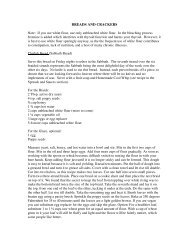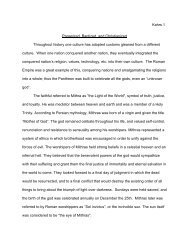durst not ga<strong>the</strong>r manna <strong>the</strong>reon, when it was given <strong>the</strong>m fromheaven.” (History of <strong>the</strong> Ancient Christians, pp. 336-337)“Ano<strong>the</strong>r quotation from <strong>the</strong> church historian, Sozomen, whowas a contemporary of Socrates, declares: ‘The people ofConstantinople, <strong>and</strong> almost everywhere, assemble toge<strong>the</strong>r on <strong>the</strong>Sabbath, as well as on <strong>the</strong> first day of <strong>the</strong> week, which custom isnever observed at Rome or at Alex<strong>and</strong>ria.’ (Sozomen,Ecclesiastical History, b. 7, ch. 19, found in Nicene <strong>and</strong> Post-Nicene Fa<strong>the</strong>rs, 2d Series, vol. 2)” (Truth Triumphant, p. 248)Thus <strong>the</strong> Waldenses <strong>and</strong> all Christians, except those at Rome <strong>and</strong>Alex<strong>and</strong>ria, observed <strong>the</strong> Seventh-day Sabbath during <strong>the</strong> firstseveral centuries after <strong>the</strong> cross.“The Waldenses were so thoroughly a Bible people that <strong>the</strong>ykept <strong>the</strong> seventh-day Sabbath as <strong>the</strong> sacred rest day for centuries.Two centuries after Pope Gregory I (A.D. 602) had issued <strong>the</strong> bullagainst <strong>the</strong> community of Sabbathkeepers in <strong>the</strong> city of Rome, achurch council which disclosed <strong>the</strong> extent of Sabbathkeeping inthat peninsula was held at Friaul, nor<strong>the</strong>rn Italy (c. A.D. 791).Friaul was one of <strong>the</strong> three large duchies into which <strong>the</strong> Lombardkingdom had been originally organized. This council, in itscomm<strong>and</strong> to all Christians to observe <strong>the</strong> Lord’s Day, testified to<strong>the</strong> wide observance of Saturday as follows: ‘Fur<strong>the</strong>r whenspeaking of that Sabbath which <strong>the</strong> Jews observe, <strong>the</strong> last day of<strong>the</strong> week, which also all peasants observe.’ (Mansi, SacrorumConciliorum Nova et Amplissima Collectio, vol. 13, p. 852)About one hundred years later (A.D. 865-867), when <strong>the</strong> sharpcontest between <strong>the</strong> Church of Rome <strong>and</strong> <strong>the</strong> Greek Church over<strong>the</strong> newly converted Bulgarians <strong>and</strong> <strong>the</strong>ir observance of <strong>the</strong>Sabbath came to <strong>the</strong> front, <strong>the</strong> question again entered into <strong>the</strong>controversy, as can be seen in <strong>the</strong> reply of Pope Nicolas I to <strong>the</strong> onehundred six questions propounded to him by <strong>the</strong> Bulgarian king.”(Allix, The Ancient Churches of Piedmont, p. 154)45
In addition to correctly believing that <strong>the</strong> Mosaic <strong>Law</strong> ought tobe observed, <strong>the</strong> Waldenses also observed <strong>the</strong> festivals, or God’sHoly Days. Samuel Kohn, a Jewish rabbi, wrote a book about <strong>the</strong>Bosnian Cathars in Hungary. (Remember that Cathars is ano<strong>the</strong>rname given <strong>the</strong> Waldenses as stated earlier.) “The hymnal waswritten in Hungarian. It consisted of one hundred <strong>and</strong> two hymns.Forty-four for <strong>the</strong> Sabbath, five for <strong>the</strong> New Moon, eleven forPassover <strong>and</strong> Unleavened Bread, six for <strong>the</strong> Feast of Weeks, sixfor Tabernacles, three for New Year, one for Atonement, <strong>and</strong>twenty-six for everyday purposes.” (Bosnia Cathars) 1588-1623Samuel Kohn: Die Sabbatharier in Siebenburgen Ihr Geshichte,Literalur, und Dogmatik, Budapest, Verlag von Singer & Wolfer,1894; Lipzig, Verlag von Franz Wager, p. 55. Translated byGerhard O. Marx)Samuel Kohn elaborates, “Fur<strong>the</strong>rmore <strong>the</strong>y celebrated <strong>the</strong> threemain Jewish Feasts: <strong>the</strong> celebration of <strong>the</strong> unleavened bread for aweek <strong>and</strong> <strong>the</strong> Feast of Tabernacles, for which <strong>the</strong>y had providedseveral songs which tell <strong>the</strong> history <strong>and</strong> <strong>the</strong> meaning of <strong>the</strong>celebration concerned. In particular <strong>the</strong> first of <strong>the</strong>se celebrations,which <strong>the</strong>y tended to call Passover in <strong>the</strong> Hungarianised Hebrewterm, was held in great admiration among <strong>the</strong>m. They ate onlyunleavened bread during <strong>the</strong> time, ‘although <strong>the</strong>y had not comeout of Egypt <strong>the</strong>mselves with <strong>the</strong> Jews.’ They observed <strong>the</strong> first<strong>and</strong> seventh day as high holidays, <strong>and</strong> <strong>the</strong> days lying between<strong>the</strong>m, which were designated weekdays of <strong>the</strong> Passover after <strong>the</strong>literal translation of <strong>the</strong> Hebrew designation usual ‘with <strong>the</strong> Jews’,demi-feast days. This celebration had for <strong>the</strong>m, apart from itsdirect Biblical meaning, in addition <strong>the</strong> significance of ‘<strong>the</strong> futureredemption’ which Jesus will bring when he comes again toestablish <strong>the</strong> millennial Kingdom of God. One of <strong>the</strong>ir Passoverhymns refers to this deliverance of which <strong>the</strong> deliverance of <strong>the</strong>Jews is a reminder. The memory of <strong>the</strong> marvelous release of46
- Page 2 and 3: CHAPTER 1ARMAGEDDONSeptember 11, 20
- Page 4 and 5: War in HeavenLong before this world
- Page 7 and 8: Days. Remember that the word congre
- Page 9 and 10: We can illustrate this principle li
- Page 11 and 12: Note that God says that the feasts
- Page 13 and 14: Here is the typed form of this lett
- Page 15 and 16: from the Hebrew word mo'ed and mean
- Page 17 and 18: and not once is there any mention t
- Page 19 and 20: I know, there is no verse which spe
- Page 21 and 22: the Holy Days where work is not to
- Page 23 and 24: convocation: ye shall do no servile
- Page 25 and 26: see that our time of hard labor is
- Page 27 and 28: y Jesus what he was supposed to pre
- Page 29 and 30: heaven. In Matthew 5:18 Jesus said,
- Page 31 and 32: ought to worship.” (John 4:19-20)
- Page 33 and 34: and some of them have I followed. F
- Page 35 and 36: “The arrogant pretensions of the
- Page 37 and 38: Pope Victor decided, therefore, to
- Page 39 and 40: the Sabbath on the seventh-day to S
- Page 41 and 42: Their practices corresponded with t
- Page 43 and 44: who lived before the middle of the
- Page 45: implies, as we have had occasion to
- Page 50 and 51: demanded that the law of the Old Te
- Page 52 and 53: influence of the Puritans was felt,
- Page 54 and 55: early Christians in India were obse
- Page 56 and 57: CHAPTER 5OBJECTIONS TO THE OBSERVAN
- Page 58 and 59: Ephesians 2:15“Having abolished i
- Page 60 and 61: Acts Chapter 15Many say that Acts c
- Page 62 and 63: worshipped the sun on the day of th
- Page 64 and 65: As mentioned earlier, the Church ev
- Page 66 and 67: will also forget thy children.” (
- Page 68 and 69: ather than in the image of God, the
- Page 70 and 71: etween holy and unholy, and between
- Page 72 and 73: When We Worship(The Third Angel’s
- Page 74 and 75: If we choose to worship on God’s
- Page 76 and 77: keep the commandments of God, and t
- Page 78 and 79: epresented the fact that with God
- Page 80 and 81: First FruitsThe festival of First F
- Page 82 and 83: that our judgment day is near. Reve
- Page 84 and 85: of the plan of salvation. You see,
- Page 86 and 87: the latter rain. Water refreshes us
- Page 88 and 89: CHAPTER 9CHANGE IS DIFFICULTWe are
- Page 90 and 91: they were worshipping on God’s Ho
- Page 92 and 93: ADDITIONAL RESOURCESFor a much more




